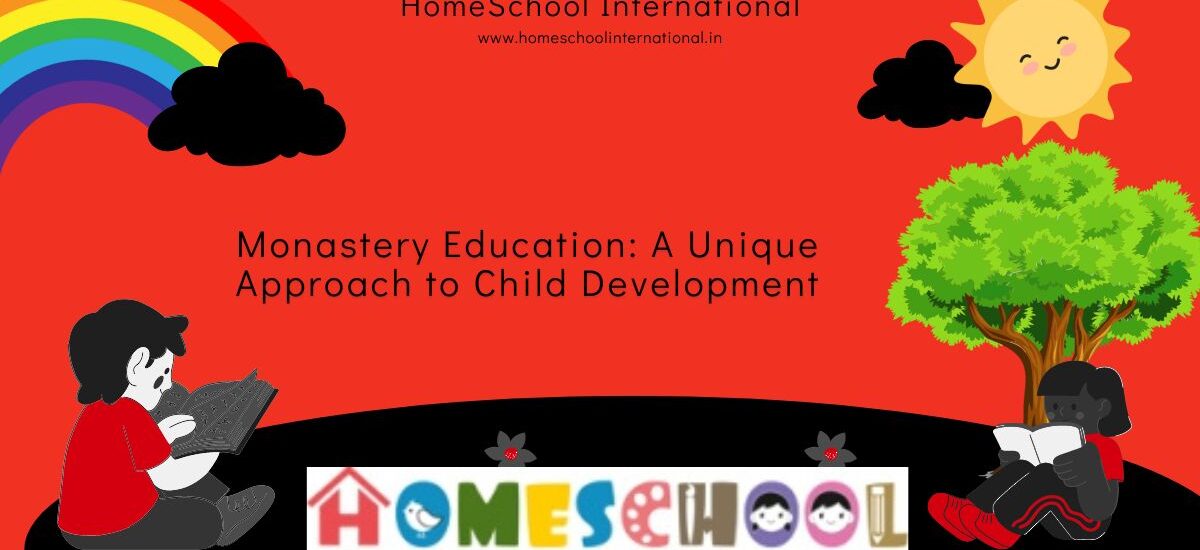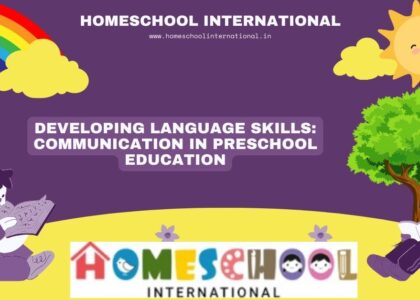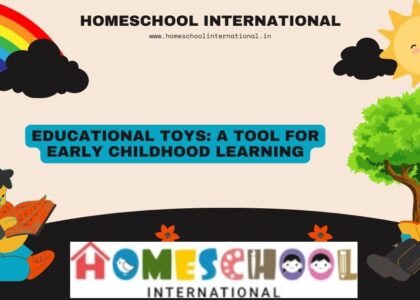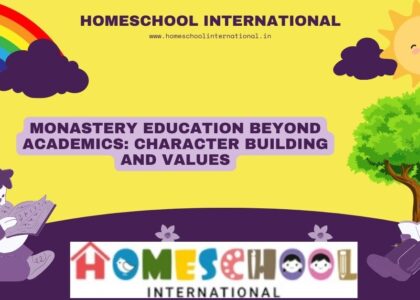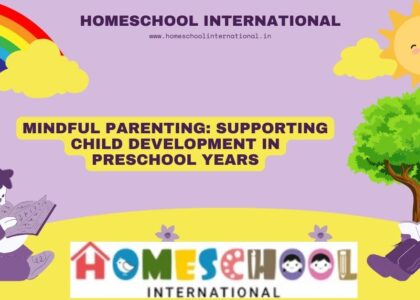Monastery Education: A Unique Approach to Child Development- In the realm of child development, traditional education systems often dominate the landscape. However, amidst the familiar methods lies a lesser-known yet profoundly impactful approach: Monastery Education. At Homeschool International, we are passionate about exploring innovative avenues for nurturing young minds, and today, we delve into the distinctive realm of Monastery Education and its unparalleled role in shaping holistic child development.
In this blog post, we unravel the history, philosophy, and practical implementation of Monastery Education, shedding light on its unique principles and profound implications for child growth. As co-founders of Homeschool International, we believe that every child deserves a tailored approach to education—one that not only equips them with academic knowledge but also cultivates their emotional intelligence, creativity, and sense of purpose.
Join us on this enlightening journey as we uncover the essence of Monastery Education and its transformative impact on young learners. Through exploring its key components, benefits, and practical applications, we aim to empower parents and educators alike to embrace this unconventional yet enriching approach to child development.
Also Check: Daycare Dilemmas: Tips for Selecting the Ideal Childcare
The History and Philosophy of Monastery Education
Monastery education traces its roots back to ancient times when monastic communities served as centers of learning and spiritual growth. Originating in religious settings, this educational approach was characterized by a holistic emphasis on intellectual, moral, and spiritual development. Over the centuries, monastery education has evolved, adapting its principles to meet the changing needs of society while retaining its core values of discipline, inquiry, and service.
Philosophical Foundations: At the heart of monastery education lies a profound philosophy that views education as more than the mere acquisition of knowledge. Drawing inspiration from the teachings of spiritual leaders and philosophers, monastery education emphasizes the interconnectedness of mind, body, and spirit. It encourages students to explore the deeper questions of existence, cultivating wisdom, compassion, and a sense of purpose along the way.
Points of Departure from Conventional Education: What sets monastery education apart from conventional schooling? Unlike traditional educational models focused primarily on academic achievement, monastery education prioritizes the holistic development of the individual. It embraces a broader understanding of intelligence, recognizing the importance of emotional resilience, moral character, and social responsibility. By fostering a nurturing environment where students are encouraged to explore their unique talents and passions, monastery education offers a refreshing alternative to mainstream educational practices.
Key Components of Monastery Education
In monastery education, academics are not viewed in isolation but as an integral part of a broader educational experience. Subjects such as mathematics, science, literature, and history are taught not only to impart knowledge but also to foster critical thinking, creativity, and problem-solving skills. Through interdisciplinary approaches and hands-on learning activities, students gain a deeper understanding of the world around them and develop a lifelong love for learning.
Spiritual Development: Central to monastery education is the cultivation of spiritual values and virtues. Drawing inspiration from religious traditions or philosophical principles, monastery schools provide opportunities for students to explore questions of meaning, purpose, and morality. Whether through meditation, prayer, or ethical discussions, students are encouraged to develop a sense of inner peace, empathy, and ethical conduct, laying the foundation for a meaningful and fulfilling life.
Practical Skills: Beyond academics and spirituality, monastery education places a strong emphasis on practical skills and life competencies. From gardening and woodworking to cooking and sewing, students engage in hands-on activities that promote self-sufficiency, creativity, and resourcefulness. By learning how to cultivate a garden, build a shelter, or prepare a meal from scratch, students develop confidence, independence, and a sense of connection to the natural world.
Also Check: Inside the Classroom: A Day in the Life
Benefits of Monastery Education for Child Development
One of the primary benefits of monastery education is its focus on holistic child development. Unlike traditional schooling, which often prioritizes academic achievement above all else, monastery education recognizes the importance of nurturing every aspect of a child’s being – intellectual, emotional, social, and spiritual. By providing a well-rounded education that addresses the needs of the whole child, monastery schools foster resilience, empathy, and a sense of purpose.
Critical Thinking and Creativity: Monastery education encourages students to think critically, question assumptions, and explore alternative perspectives. Rather than simply memorizing facts and regurgitating information, students are challenged to engage in deep inquiry, analyze complex problems, and develop innovative solutions. Through open-ended discussions, creative projects, and experiential learning opportunities, students cultivate their intellectual curiosity, imagination, and problem-solving skills.
Emotional Resilience: In today’s fast-paced and uncertain world, emotional resilience is more important than ever. Monastery education provides a nurturing environment where students feel valued, supported, and encouraged to express themselves authentically. By fostering strong relationships with teachers and peers, students develop a sense of belonging and emotional intelligence. They learn to navigate challenges, cope with setbacks, and bounce back from adversity with grace and resilience.
Implementing Monastery Education at Home
One of the key aspects of implementing monastery education at home is creating a conducive learning environment that fosters curiosity, exploration, and growth. Designate a quiet, organized space for learning activities, free from distractions and clutter. Stock the environment with books, art supplies, and other resources that encourage creativity and independent inquiry. Establish daily routines and rituals that provide structure and stability while allowing flexibility for spontaneous learning experiences.
Fostering Parental Involvement: Central to the success of monastery education at home is active parental involvement. Parents serve as learning facilitators, mentors, and role models, guiding their children on their educational journey. Take an active interest in your child’s interests, passions, and challenges, and provide support and encouragement every step of the way. Engage in meaningful conversations, ask open-ended questions, and celebrate achievements, no matter how small. By actively participating in your child’s education, you not only deepen their learning experience but also strengthen your bond as a family.
Embracing Experiential Learning: Monastery education emphasizes experiential learning – learning by doing. Take advantage of everyday opportunities to engage in hands-on activities that promote exploration, discovery, and creativity. Plant a garden together, cook a meal from scratch, or embark on a nature hike to observe the wonders of the natural world. Encourage your child to ask questions, make observations, and draw connections between their experiences and the world around them. By embracing experiential learning, you not only enrich your child’s education but also create lasting memories and meaningful connections.
Also Check: Building a Strong Foundation: Benefits of Early Childhood
Conclusion: Monastery Education- A Unique Approach to Child Development
As we conclude our exploration of monastery education and its profound impact on child development, it’s essential to reflect on the journey we’ve undertaken. From uncovering the rich history and philosophical foundations to exploring practical implementation strategies, we’ve gained valuable insights into this unique approach to education. Monastery education offers a refreshing alternative to conventional schooling, prioritizing holistic development, critical thinking, and emotional resilience.
As co-founders of Homeschool International, we are committed to championing innovative approaches to education that empower children to thrive in an ever-changing world. We believe that monastery education has the potential to revolutionize the way we think about learning, inspiring a new generation of thinkers, creators, and leaders. By embracing the principles of monastery education and fostering a spirit of curiosity, inquiry, and collaboration, we can create a brighter future for all.
We invite you to join us on this journey towards a more enlightened approach to education. Whether you’re a parent seeking alternative learning opportunities for your child or an educator passionate about transforming the education system, there’s a place for you in our community. Together, let’s work towards building a world where every child has the opportunity to reach their full potential and contribute positively to society.
If you’re interested in learning more about monastery education or how Homeschool International can support your educational journey, we’d love to hear from you. Reach out to us today to explore our programs, resources, and community events. Together, we can make a difference in the lives of children and families around the world.


